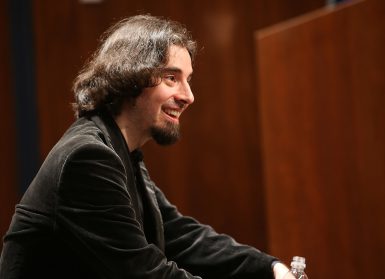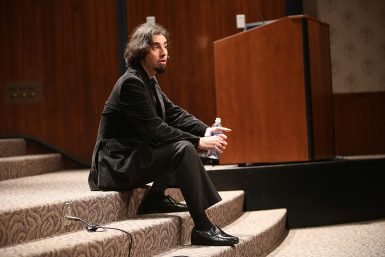Portnow encourages young designers to explore ‘magic of games’

While some consider them sheer entertainment, video games have the potential to help players understand empathy, experience the lives of others or consider problems in different ways.
“Games are more than a pastime to fill the hours between work and sleep,” game designer James Portnow told his audience at Whittenberger Auditorium Monday evening. “Through a game, you can experience another life, and that’s the magic of games.”
As the school’s second Speaker Series guest of the semester, Portnow talked to an audience of about 200 about the power of games. After working on Call of Duty and FarmVille, Portnow helped found Divide by Zero, an indie game studio. He is a consultant for the company Rainmaker Games and is the co-creator and writer for an educational YouTube series called Extra Credits.
Portnow said because games have the capacity to teach empathy, transport players to new worlds and educate players without necessarily teaching them, games are one of the most important forms of media.

Players have the power to make their own decisions and fully immerse themselves in the human experience, he said. Video games are the first mass medium where audience members are not passive onlookers, but rather participants in the action.
“How kids spend their leisure time is more engaging,” said Portnow. “We have games, YouTube, movies, and we need to combine how to engage people through education. Education is no longer about just retention, but how you use that information.”
Through his work with Extra Credits, Portnow is exploring this idea himself. He also lectures on game design at DigiPen Institute of Technology in Washington, inspiring the next generation of designers and planting the idea of education.
This ability to freely choose how the story ends and what the outcome will be is an education in itself, he said.
He recalled working with children in a struggling neighborhood where college wasn’t really an option. One boy who was playing a video game in class kept using the same ineffective strategy, “dying” and getting frustrated. But then he tried again with a different approach and succeeded.
“In that experience, he saw that his choices changed his consequences,” Portnow said. “That’s what education is about. It’s about teaching people to be lifelong learners, and it’s about empowering people to create the life they want. That game empowered the kid to see some path out of his neighborhood.“

Merging games and learning is an area he said does not get enough attention. He encouraged the young designers in the audience to create games that make these connections with users, to enhance lives and learning.
“In a way, my generation failed in this respect,” Portnow said. “We focused on the wrong things and lost that magic by trying to be too much like television or movies.”
After his talk, Portnow, the Speaker Series’ first game designer, answered questions from the long line of aspiring game designers.
“Having him was a big deal,” said Mike Sellers, a professor of practice in game design. “In the game design program, we try to focus on education as well as the industry, so having him speak was a great way to do that.”

Not only did the talk extend 45 minutes to answer questions, but a smaller group of game design students met with Portnow afterward and spoke for hours in the game design lab at Franklin Hall.
“I thought the whole thing was very inspiring,” said Joshua Smith, a junior studying game design. “It reminded me why I’m pursuing this path and why this is a path that’s worth pursuing.”
More:
- Learn more about the school’s Speaker Series.
- Check out the Bachelor of Science in Game Design degree.

